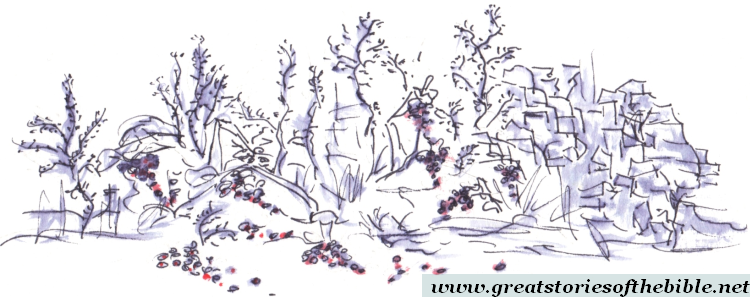Isaiah - episode 2
The Lord’s vineyard
In the present post we continue reading the Book of Isaiah with the “poem of the vineyard” (Isa 5,1-7). «Let me sing for my well beloved a song of my beloved about his vineyard. My beloved had a vineyard on a very fruitful hill». Isaiah speaks about a mysterious «beloved» and his «vineyard»: the setting is rural, but involving beneaththe love theme (in the Song of Solomon those two words indicate the two lovers: see for example Song 2,16 and 8,12). The Beloved fondly takes care of his vineyard: «He dug it up, gathered out its stones, planted it with the choicest vine, built a tower in its midst, and also cut out a winepress therein». To this effort should matcha good harvest, instead «He looked for it to yield grapes, but it yielded wild grapes», bitter and uneatable. The Beloved speaks and presents new characters: «“Now, inhabitants of Jerusalem and men of Judah, please judge between me and my vineyard. What could have been done more to my vineyard, that I have not done in it? Why, when I looked for it to yield grapes, did it yield wild grapes?». Jerusalem and Judah are invited to judge the perverse behavior of the vineyard, that made vain the prompt care by the Beloved. There is no answer and so the Beloved himself pronounces the judgement, revealing His identity: «Now I will tell you what I will do to my vineyard. I will take away its hedge, and it will be eaten up. I will break down its wall of it, and it will be trampled down. I will lay it a wasteland. It won’t be pruned nor hoed, but it will grow briers and thorns. I will also command the clouds that they rain no rain on it.”». Who but God can command the clouds? «For the vineyard of the LORD of hosts is the house of Israel, and the men of Judah his pleasant plant: and he looked for justice, but, behold, oppression; for righteousness, but, behold, a cry of distress». Those who were asked to judge are indeed the defendant («the men of Judah»); I underline that the sin which offended the Lord is not directly against Him, but against the poor and weak persons who suffer injustice.

Let us read with more detail the series of “woes” that follows the poem of the vineyard; to the Hebrew society of that time the «woe» is a funeral lament: the last prophetic call to conversion to persons who are bringing death in their and their neighbors’ life with the evil actions they are committing. «Woe to those who join house to house, who lay field to field, until there is no room, and you are made to dwell alone in the midst of the land! [...] Woe to those who rise up early in the morning, that they may follow strong drink; who stay late into the night, until wine inflames them! [...] Woe to those who draw iniquity with cords of falsehood, and wickedness as with cart rope; Who say, “Let him make speed, let him hasten his work, that we may see it; and let the counsel of the Holy One of Israel draw near and come, that we may know it!” Woe to those who call evil good, and good evil; who put darkness for light, and light for darkness; who put bitter for sweet, and sweet for bitter! Woe to those who are wise in their own eyes, and prudent in their own sight! Woe to those who are mighty to drink wine, and champions at mixing strong drink; who acquit the guilty for a bribe, but deny justice for the innocent!» (Isa 5,8.11.18-23). The Lord’s punishment is terrible: «He will lift up a banner to the nations from far, and he will whistle for them from the end of the earth. Behold, they will come speedily and swiftly. [...] Their roaring will be like a lioness. They will roar like young lions. Yes, they shall roar, and seize their prey and carry it off, and there will be no one to deliver» (Isa 5,26.29: maybe the Assyrians?). The announcement of judgement and punishment is not God’s last action: in the poem of Isa 5,1-7 the word «vineyard» is repeated six times (this number indicate something lacking or incomplete). We can find the seventh recurrence of “the Lord’s vineyard” in Isa 27,2-6: «In that day, sing to her, “A pleasant vineyard! I, the LORD, am its keeper. I will water it every moment. Lest anyone damage it, I will keep it night and day. Wrath is not in me, but if I should find briers and thorns, I would do battle! I would march on them and I would burn them together. Or else let him take hold of my strength, that he may make peace with me. Let him make peace with me.” In days to come, Jacob will take root. Israel will blossom and bud. They will fill the surface of the world with fruit».
Here are the two themes that the prophets often discuss: the love/marriage metaphor to qualify the warm and passionate relationship between the Lord and His people; the justice towards poor and humble persons as a criteriontorecognize whether thefaithand religious practicesofIsraelareauthenticor not. Apostle John, several centuries later, offers us a good synthesis of that: «If a man says, “I love God,” and hates his brother, he is a liar; for he who does not love his brother whom he has seen, cannot love God whom he has not seen» (1John 4,20).
In the next posts we will continue the reading of Isaiah with the well-known verses about the Immanuel and the “shoot of Jesse”.